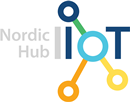NTNU is a university with an international focus, with headquarters in Trondheim and campuses in Ålesund and Gjøvik. NTNU has a main profile in science and technology, a variety of programmes of professional study, and great academic breadth that also includes the humanities, social sciences, economics, medicine, health sciences, educational science, architecture, entrepreneurship, art disciplines and artistic activities. NTNU has four strategic areas of research in 2014–2023: sustainability, energy, oceans, and health.
NTNU is part of N5T, with a focus on Nordic cooperation, and has as a goa to “seek participation in established and new European Institute of Innovation and Technology (EIT) Knowledge and Innovation Communities (KICs)”. This process can be accelerated via the Hub collaboration with the EIT Digital (KTH). Regarding IIoT collaboration, “NTNU should establish long-term cooperation with selected international academic groups at the forefront of their fields”. HI2OT fits well with the goals that “arrangements should be made to provide NTNU’s permanent academic staff with opportunities for research stays abroad” and “during their PhD period, at least 40 % of NTNU’s PhD candidates should have a research stay abroad”.
The strategy has recognized already in 2011, that digitization and automation are crucial for future production in Norway. At NTNU, ICT has a strong focus, and IIoT is addressed by NTNU Digital “NTNU Digital covers control engineering, robotics, wired and wireless communications to electronics and materials.”
NTNU – Production Systems Group
Production Systems (PS) is a research group at the Department of Mechanical and Industrial Engineering at NTNU, the largest department towards industrial production in Norway. The research group combines robotics, machine tool technology and metrology with automatic control and sensor systems. The research benefit from synergy between the manufacturing industry with its strong focus on cost effective operations, and the offshore and maritime industry with high-value products in small batches. PS consists of over 4 scientific staff, 2 postdocs and 13 PhDs.
